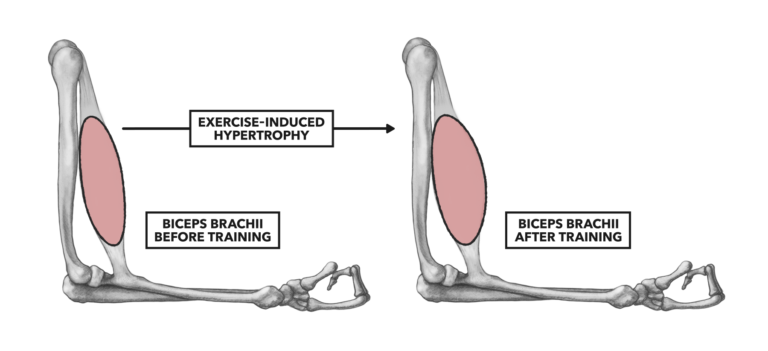Muscle hypertrophy is the process of increasing the size of muscle fibers by increasing the size of the individual cells or the number of cells. It is the result of an increase in the volume of muscle fibers due to an increase in the number of contractile proteins and non–contractile proteins. It is triggered by a greater workload on the muscle, such as lifting weights or increasing the intensity of physical activity.
How to increase your muscle fibers using muscle hypertrophy process?
- Increase the intensity of your workouts:
Increase the load, decrease the rest time between sets, and increase the number of reps.
- Increase your volume:
Increase the number of sets and reps you do in each workout. - Increase nutrient intake:
Make sure you are eating enough protein and carbohydrates to support your muscle growth. You can use my free protein calculator by clicking here.
- Use progressive overload:
Increase the amount of weight or resistance you use in each workout. - Change up your exercises:
Doing the same exercises over and over again can lead to muscle adaptation. Switch up your exercises or the order in which you do them to keep your muscles challenged. - Increase rest time:
Make sure you are getting enough rest between workouts so that your muscles have time to recover and grow. - Track your progress:
Track your progress so that you can make sure you are making progress and adjust your routine accordingly. - Get Enough Sleep:
Getting enough sleep is essential for muscle growth and recovery. Aim for 7–9 hours of sleep per night. - Take Rest Days: Taking rest days allows your muscles to recover and grow. Try to take at least one rest day per week. Over-training is not healthy!

How often to lift to achieve muscular hypertrophy?
Muscular hypertrophy can be achieved by exercising regularly depending on your goal.
Here are some weight-lifting schedules you might like:
-
A three-day-a-week lifting program (especially heavy weights). A day in between sessions gives your muscles a chance to recover. Recovery is extremely essential for muscle growth.
-
Lifting just two days a week, depending on your current fitness level.
-
Alternating between upper-body lifting and lower-body lifting on different days. This allows you to work different muscles while allowing time for rest and recovery.

Workout tips to maximize your results
-
The reps-and-rest cycle should be used. According to research, weightlifters should aim for six to twelve repetitions per set. Ideally, you should allow 60-90 seconds of rest between sets. Your muscles will be fatigued by doing this, which will result in hypertrophy.
-
Make sure you lift enough weight. A lightweight won’t give you the same definition gain as a heavier one.
-
Exercise and activities should be varied. By doing this, you will stimulate different muscle fibers in the same movement or circuit.
-
Consider working with a trainer. A certified trainer can help you create a weightlifting program to meet your goals. Interested to train with one, you can always reach out by clicking here.
- Ensure you are taking a decent amount of protein. One of the best protein powder I’ve ever used is the one from Optimum nutrition which can be found here: Best Whey Protein
The muscles in your body can adapt quickly to exercise. In order to continue seeing growth and increased definition in your muscles, you must challenge them continuously. Make sure you lift weights gradually instead of increasing them rapidly. Try to gradually increase your workload each week instead.
Conclusion
Muscle hypertrophy is an important process for maintaining and improving muscle strength, size, and function. It is an adaptive response to exercise that increases muscle size in response to the overload of the muscle fibers. With adequate nutrition, proper rest, and consistent training, muscle hypertrophy can be achieved by anyone.
 Loading ... Still faster than Windows update
Loading ... Still faster than Windows update


